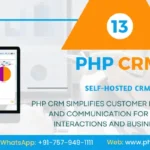In today’s fast-paced, data-driven world, businesses must adopt smart solutions to streamline their processes, improve efficiency, and foster better relationships with their customers. One of the most powerful tools available to businesses for achieving these goals is Customer Relationship Management (CRM) software. Designed to manage interactions with customers and prospects, CRM software plays a crucial role in sales and marketing. Here’s why businesses should leverage CRM software for their sales and marketing efforts.
1. Centralized Customer Data
A CRM system centralizes all customer information in one location. This includes contact details, purchase history, preferences, feedback, and interactions across multiple channels such as email, phone calls, social media, and live chats. Sales and marketing teams can access this information instantly, which helps them understand customer needs and tailor their strategies accordingly. Having all customer data in one place reduces data silos, ensuring that no valuable information is lost or overlooked. Whether you are responding to a customer query, creating a personalized marketing campaign, or following up on sales opportunities, a CRM system provides a single, consistent view of your customers.
2. Improved Sales Management
CRM software offers significant advantages when it comes to managing the sales pipeline. It enables sales teams to track leads, prospects, and opportunities through various stages of the sales cycle. With a clear overview of the pipeline, businesses can prioritize high-value opportunities, nurture relationships, and forecast sales more accurately. Furthermore, CRM software allows you to automate key sales processes, such as follow-up emails, meeting reminders, and task assignments. This reduces the administrative burden on sales representatives, allowing them to focus on building relationships and closing deals.
3. Better Customer Segmentation
CRM systems enable businesses to segment their customers based on specific criteria, such as demographics, buying behavior, and preferences. This segmentation allows marketing teams to create highly targeted campaigns that resonate with the right audience. For example, you could create a targeted email campaign for repeat buyers or special offers for high-value customers. By delivering relevant, personalized content, businesses can increase customer engagement, drive conversions, and enhance customer satisfaction.
4. Personalized Marketing Efforts
CRM software empowers businesses to send personalized messages to customers at the right time. By tracking customer interactions, preferences, and purchasing behavior, CRM systems can help marketers craft messages that speak directly to each individual customer. Personalization boosts customer loyalty, as customers are more likely to engage with businesses that understand their needs and deliver tailored solutions. CRM software also enables marketers to track the performance of personalized campaigns in real-time, making it easier to optimize efforts and achieve better results.
5. Streamlined Marketing Campaigns
Managing multiple marketing channels and campaigns can be time-consuming and complex. CRM software helps simplify this by providing a unified platform to plan, execute, and track campaigns across various channels, including email, social media, and paid advertising. With CRM tools, businesses can schedule campaigns, automate marketing workflows, and analyze results in real-time. This not only saves time but also ensures that marketing teams can adjust campaigns on the fly to improve performance.
6. Improved Customer Retention
CRM software is not only about acquiring new customers; it also plays a critical role in retaining existing ones. By providing a comprehensive view of customer interactions and purchase history, CRM systems allow businesses to anticipate customer needs and provide proactive support. You can set reminders to follow up with customers, send them loyalty rewards, or offer personalized promotions based on their preferences. This level of personalized attention helps build trust, enhance satisfaction, and ultimately increases customer loyalty and retention.
7. Actionable Insights and Analytics
One of the standout features of CRM software is its ability to generate actionable insights and analytics. Through reporting tools and dashboards, CRM systems provide valuable data on customer behavior, sales trends, and marketing performance. These insights help businesses make data-driven decisions that optimize sales and marketing strategies. By analyzing customer touchpoints and engagement levels, businesses can identify which tactics are working and which are not. This allows for quick course correction, ensuring that resources are spent on the most effective sales and marketing efforts.
8. Enhanced Collaboration Between Sales and Marketing Teams
In many organizations, sales and marketing teams often work in silos, leading to miscommunication and inefficiency. CRM software promotes collaboration by providing both teams with access to the same customer data and insights. This shared information helps align their goals, ensuring that marketing efforts are effectively driving sales and that sales teams are equipped with the right tools and information to close deals. With CRM systems, sales and marketing teams can collaborate on lead generation, customer nurturing, and campaign execution, ensuring a seamless customer journey from initial contact to conversion.
9. Better Customer Support
CRM software also facilitates excellent customer service, which is an integral part of the sales and marketing process. By maintaining a detailed history of customer interactions, CRM systems enable support teams to offer faster, more efficient service. Customers who feel well-supported are more likely to return for repeat business, improving retention and driving long-term profitability. Additionally, CRM systems allow businesses to track customer complaints or issues, ensuring that they are addressed promptly and thoroughly.
10. Scalability and Flexibility
As your business grows, so do your sales and marketing needs. CRM software is scalable, meaning it can adapt to your evolving business requirements. Whether you need to manage an increasing number of leads, expand your marketing campaigns, or integrate new sales tools, CRM systems can accommodate these changes without causing disruption. Cloud-based CRM software is especially beneficial in this regard, as it allows businesses to scale their operations without the need for heavy investments in infrastructure. CRM software is an invaluable tool for sales and marketing teams looking to enhance customer relationships, streamline processes, and drive growth. By centralizing customer data, enabling targeted campaigns, automating routine tasks, and providing insightful analytics, CRM systems empower businesses to make more informed decisions, improve efficiency, and deliver exceptional customer experiences. In a competitive business environment, adopting CRM software is not just an option – it’s a necessity. Whether you’re a small business or a large enterprise, CRM can transform your sales and marketing efforts, boosting both your short-term success and long-term customer loyalty. If you’re ready to unlock the potential of CRM software, explore options like PHP CRM and take your sales and marketing to the next level.













